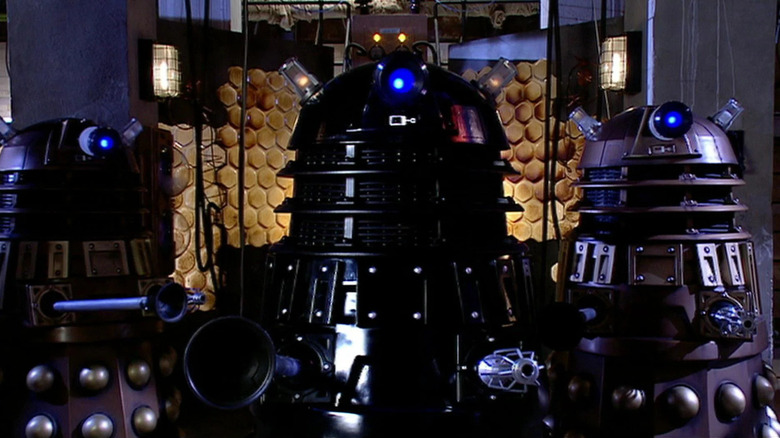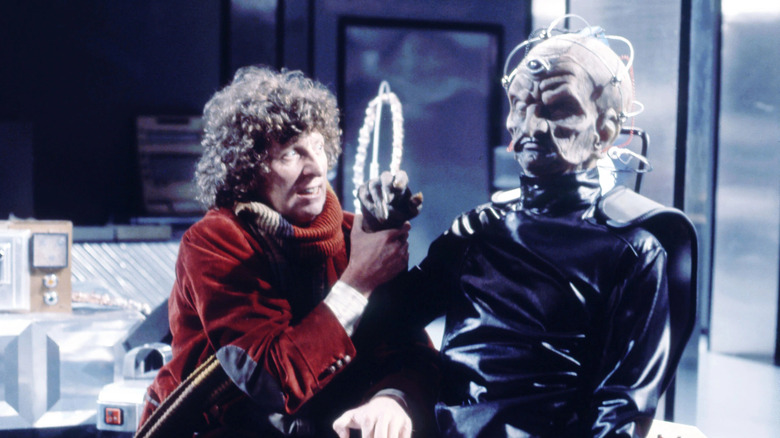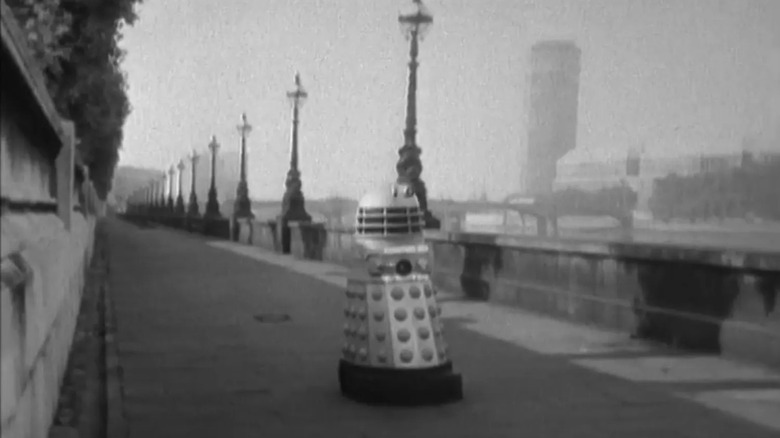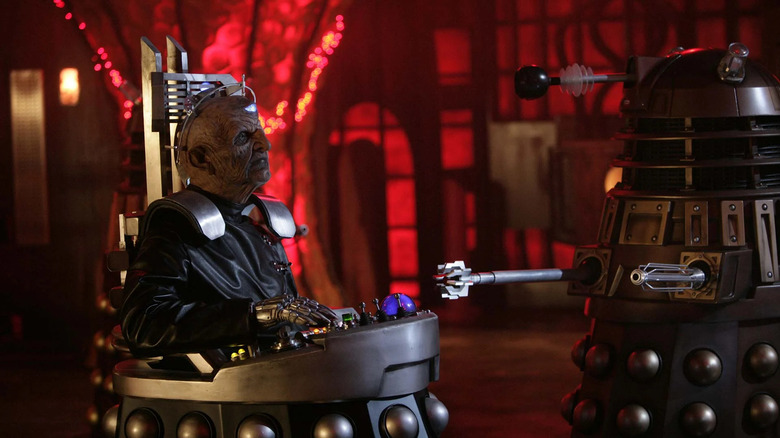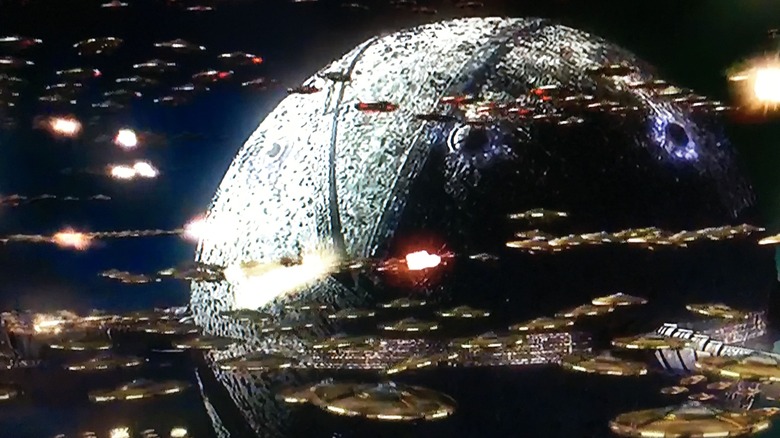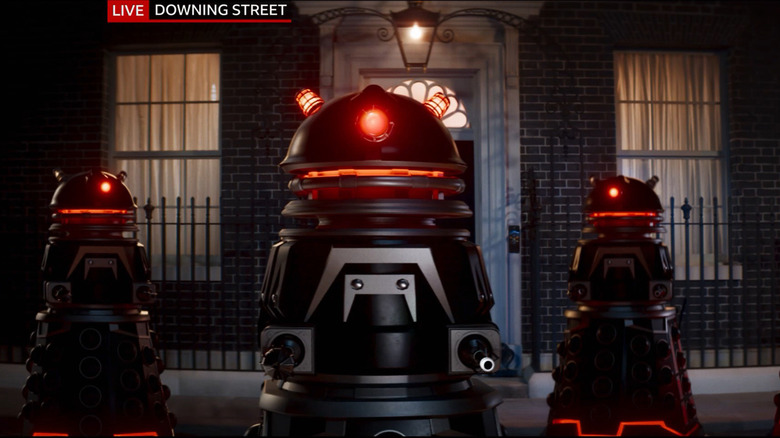Doctor Who: The Daleks' Timeline Explained
Even if you've never seen an episode of "Doctor Who," you'll probably be familiar with the Time Lord's archnemeses, the Daleks. From their humble beginnings in the early '60s, the incredibly cranky hostile aliens have become some of the most iconic baddies in all of sci-fi. Sure, it's easy to poke fun at their creaky early appearances, bumping around the cardboard sets and ubiquitous quarries that served as alien planets in many of the classic episodes.
They were hellbent on galactic conquest but scuppered by a flight of stairs, as the most common old joke goes. Later incarnations rectified that problem, fitting them with jet boosters so they could fly around, plus improving their arsenal beyond the classic laser/toilet plunger combo. Yet the basic design remained the same and the fact is they are deeply unsettling, with their turret-like head, telescopic eye-scanner thing, and their chilling desire to exterminate anything that isn't a Dalek.
The very first Doctor, William Hartnell, encountered the Daleks in a seven-part 1963 serial known simply as "The Daleks," which gave the creatures their first backstory. They have been regular adversaries for every Doctor since apart from the Eighth, Paul McGann, although other media took care of that for him. As the series developed in the '70s, the show writer Terry Nation indulged in a bit of revisionism and created a second origin story for his most famous creations in the revered 1975 serial "Genesis of the Daleks." As if things weren't confusing enough, trying to keep track of the chronology of a time-traveling Time Lord and his time-traveling archenemies.
The BBC retconned that in 2021 with their official timeline of the Daleks, changing it so the First Doctor's first encounter with them actually happened a century later in the Dalek's timeline. Now the Doctor apparently bumped into a separate faction that stayed behind on their home planet, Skaro, while the others went off through time and space looking for new worlds to conquer. Are we all clear so far?
Me neither, but hang in there. I've only ever been the most casual "Doctor Who" viewer, maybe catching one or two episodes of each regeneration since the show was revamped in 2005. I loved it as a kid, but then I was only really in it for the aliens and paid little attention to all the lore stuff. Let's make no mistake about it, there is an incredible amount of "Doctor Who" lore, from 298 stories over 869 episodes spread across the past six decades. That's before you get into the additional material from books, audio, and other media. Even dedicated Whovians acknowledge that the chronology of events can be a little tricky at the best of times, so what hope would I have? Well, here's what I found out...
So what is a Dalek, and where do they come from?
The Daleks are hideously mutated blobs shuttling about inside their own personal mini-tanks created by Davros, a mad scientist type from the planet Skaro. Davros was badly injured during a Thousand Year War between his race, the Kaleds, and their mortal enemies, the Thaleds. He was first introduced in that landmark episode "Genesis of the Daleks," where the Fourth Doctor (Tom Baker) is sent back in time to prevent the creation of the Daleks and stop them becoming the dominant species in the universe.
If you've ever wondered why the Daleks were so fond of exterminating everything, all the clues are here. Terry Nation grew up during World War II (via Warped Factor) and was inspired by the Nazis when it came to inventing the Daleks. He really leans into the comparison in "Genesis;" the Kaleds are really into sinister black military attire, Iron Cross accoutrements, throwing around Heil Hitler-style salutes, and have an obsession with racial purity.
Davros, blind and confined to a fancy wheelchair which carried his life support systems, sold out his own people to speed along his development of genetically enhanced mutants, end the war, and ensure the survival of his race. For an escapist show like "Doctor Who" this story is pretty bleak, envisioning a planet ravaged by nuclear warfare, melding the spectre of Nazism with stark Cold War terror. The Doctor can't bring himself to commit genocide and end the full production of the Daleks before it begins, although an accident does it for him, setting their development back many years. The Daleks eventually turn on their creator, exterminating Davros because he isn't pure enough for them.
The Doctor's involvement with Davros began long before the scientist dreamed up his infamous creations, however. In the two-parter "The Magician's Apprentice/The Witch's Familiar," the Twelfth Doctor (Peter Capaldi) encounters a frightened young boy on a battlefield much earlier in the Thousand Year War, surrounded by deadly "Hand mines." The Doctor initially leaves him to die when he realizes the kid will grow up to become the creator of the Daleks, but returns later to save him and seed the notion of mercy in the boy's mind. This has serious life-saving repercussions for the Doctor's companion, Clara (Jenna Coleman), in many centuries' time when the story concludes.
Out into the universe ... and to Earth
Some time after the setback at the end of "Genesis of the Daleks," the evil aliens develop space travel and time travel, setting out into the universe looking for new planets to terrorize and conquer. This gimmick allowed the series' writers to put them in all sorts of fun historical settings, from Ancient Egypt ("The Daleks' Master Plan") and the Mary Celeste ("The Chase"), to supposedly helping out Winston Churchill and the Allies fight off the Luftwaffe during World War II ("Victory of the Daleks"). The latter story gave the "Ironsides" a sweet British army green paint job and gave us Spitfires in space.
Out of all the billions of worlds in the universe, the Daleks have a particular fixation with Earth, resulting in dozens of invasion plans over the decades. An early attempt came in a more recent episode, "Resolution," where a Reconnaissance Scout landed on our planet in the 9th century, only to be thwarted by warring factions banding together to defeat it and dispatch its dismembered parts to the far-flung reaches of the globe. You can't keep an evil Dalek down, however, and an archaeologist in the 21st century unwittingly unearthed one of the pieces, which revived its missing parts and caused more havoc. Luckily, the Thirteenth Doctor (Jodie Whittaker) was on hand to cast it into a supernova before it could summon the Dalek fleet.
Returning to the early days of the show — that is, the period from the First Doctor's initial encounter with the Daleks and the Fourth Doctor's failure to annihilate them in "Genesis of the Daleks" — showdowns with the irate cyborgs skipped between adventures in the then-present day and the far future. Shortly before the seminal episode "The Daleks," they attempted to conquer Earth in the 21st Century ("Dalek Invasion of Earth"), with several Daleks trundling around London.
Without having to worry about a canonical timeline, the show's original writers gave us several dastardly Dalek masterplans, from trying to eliminate the Doctor while hiring The Master to start a space war ("Frontier in Space"), altering history to make their earlier invasion plan succeed ("The Day of the Daleks"), attempting to implant mankind with the "Dalek Factor" to make us more like them ("The Power of the Daleks"), and holding the galaxy to ransom with a lethal plague ("Death to the Daleks").
Even the Seventh Doctor (Sylvester McCoy) had an adventure set during this time period, returning to 1963 to retrieve the Hand of Omega, a powerful Time Lord weapon that the First Doctor left behind ("Remembrance of the Daleks") before tricking Davros into firing it and destroying Skaro. But wasn't Davros exterminated by the Daleks in "Genesis of the Daleks?" Yeah, about that...
Davros makes a comeback...
For all their lethal machinations, the Daleks eventually turned to their old creator Davros for help in the 46th century when they got embroiled in a war with another alien race, the Movellans. It turned out that he wasn't exterminated after all, just held in suspended animation and covered in cobwebs ("Destiny of the Daleks"). Luckily, the Fourth Doctor was able to apprehend Davros and put him in cryogenic freezing to await trial for his heinous crimes.
Now realizing that the Time Lords had been meddling with their timeline, the Daleks teamed up with Davros once again in "Resurrection of the Daleks," breaking him out of a prison ship in the far future to hatch another scheme, this time to clone the Fifth Doctor (Peter Davison) and his companions in an attempt to assassinate the Time Lord high council on Gallifrey, the Doctor's home planet.
Thwarted once again, Davros repaired to the planet Necros with a rather ghoulish plot to create another strain of Daleks using corpses ("Revelation of the Daleks"). Chronologically, this was the last Classic episode featuring the Daleks, with the Sixth Doctor (Colin Baker) in his colorful clown coat taking care of business this time.
Davros made his "Doctor Who" revival return in the two-parter "The Stolen Earth/Journey's End," where Earth was once again under threat from a massive Dalek invasion. The ambitious storyline not only crossed over with characters from two spin-offs, "Torchwood" and "The Sarah Jane Adventures," it also caught fans on the hop with the Tenth Doctor's (David Tennant) premature regeneration. You can get pills for that, mate!
Further Davros adventures followed, including the aforementioned "The Magician's Apprentice/The Witch's Familiar," which served as a prequel to the whole Davros saga. It was a heartfelt renewal of hostilities between Davros and the Twelfth Doctor, with the cunning mastermind preying on the Time Lord's innate compassion to spring another trap on Skaro.
The Time War
The earlier attempt by the Seventh Doctor to destroy Skaro led to the Time War, which came to a spectacular head in "The Day of the Doctor." This epic conflicted between the Time Lords and the Daleks lasted for around 400 years, although was spread over many millennia as they battled across space and time (via Tardis Fandom). There were allusions to the Time War in Classic storylines, but it only became a major plot point for the series from the 2005 revival onwards. "The Day of the Doctor" was a huge event to celebrate the show's 50th anniversary, claiming a Guinness World Record for the largest ever simultaneous screening of a TV show, broadcast to 94 countries worldwide and showing in select cinemas (via The Guardian).
Even I tuned in for that one, although I found the lore a bit bewildering. The BBC certainly pulled out all the stops for the episode, with a marauding Dalek fleet and a massive battle on Gallifrey. The action was a far cry from the endearingly rickety effects of the First Doctor's original adventures, which were the focus of "An Adventure in Time and Space," screened a few days earlier as part of the half-century celebrations.
The story was a major event in both the Time Lords and the Daleks' timelines. It introduced the "War Doctor" (John Hurt), who decided to end the Time War by using an ancient super weapon called the Moment to wipe out both sides. Meeting up with the Tenth and Eleventh Doctors (Matt Smith) to carry out the terrible but necessary deed, the latter's companion, Clara, convinced them there must be a better way. Summoning the help of their previous incarnations, they managed to tuck Gallifrey away in a pocket universe at the last moment, causing the Dalek fleet to destroy itself in the cataclysmic crossfire.
After the Time War and beyond...
A lone Dalek survivor was discovered on Earth by a raging Ninth Doctor (Christopher Eccleston) in "Dalek," but blew itself up when it couldn't cope with emotions resulting from its DNA being tainted by that of the Doctor's companion, Rose (Billie Piper). Some of the most notable Dalek survivors of the Time War were the Cult of Skaro, who returned to Earth in "Doomsday" with an Ark full of imprisoned Daleks, but got caught up in street warfare with those other classic "Doctor Who" villains, the Cybermen.
The Cult of Skaro were up to the old time-traveling tricks again in the two-parter "Daleks in Manhattan/Evolution of the Daleks," where the Tenth Doctor headed to 1930s New York to rumble their ghastly attempts to create a squid-headed human-Dalek hybrid.
Although the Fourth Doctor (Tom Baker) said in "Genesis of the Daleks" that his enemy had been around for 25,000 years, adventures far beyond that scope appeared in the new "Doctor Who" episodes. In "Bad Wolf/Parting of the Ways," the Ninth Doctor encountered his old foe in the distant future, set in the year 200,100.
In the present day timeline, the Thirteenth Doctor (Whittaker) had a further encounter with the Daleks in "Revolution of the Daleks," when an unscrupulous tycoon used parts of the recon scout from "Resolution" to build his own fleet of defense drones. This allowed the resurrected Dalek to build its own army, only to be wiped out by a Dalek death squad for being impure.
Jodie Whittaker is nearing the end of her tenure as the Time Lord, resulting in fevered rumors about who will take her place as the Fourteenth Doctor. There are some fascinating names in the hat for the next go at the TARDIS controls including Danny Dyer, Phoebe Waller-Bridge, Hugh Grant, and Richard Ayoade. Either one of those might be enough to turn me into a Whovian, but boringly the bookies favor David Tennant having another stint in the role. Whoever eventually gets the part, you can be sure that they will face off against Daleks sometime in the future ... or past, as the case may be.
